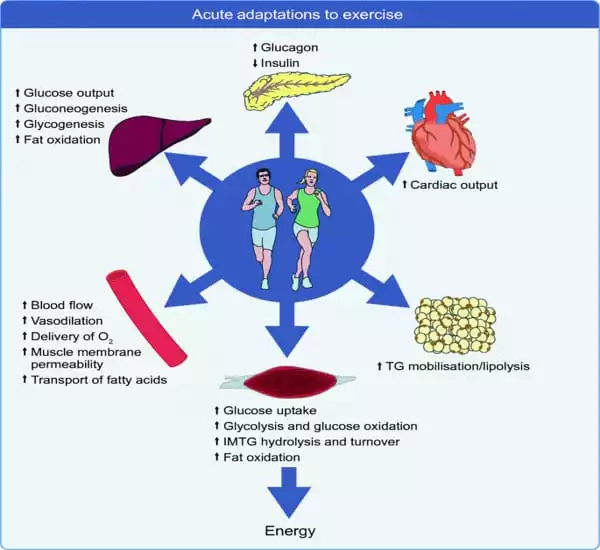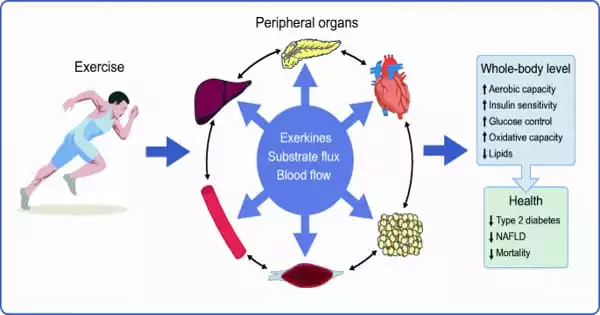Exercise is about more than just aerobic capacity and muscle mass. Yes, exercise can improve your physical health and physique, help you lose weight, improve your sex life, and even add years to your life. However, that is not what encourages the majority of individuals to stay active.
People who exercise on a daily basis do so because it offers them a tremendous sense of well-being. They have more energy throughout the day, sleep better at night, have sharper memories, and are more relaxed and optimistic about themselves and their life. It’s also an effective treatment for a variety of common mental health issues.
Exercising has been found in studies to help protect brain cells. A new study looking at the mechanisms involved in this link reveals that the function exercise plays in managing insulin and BMI levels may help protect brain volume and hence help prevent dementia. The findings were published online in Neurology®, the medical journal of the American Academy of Neurology.
“These results may help us to understand how physical activity affects brain health, which may guide us in developing strategies to prevent or delay age-related decline in memory and thinking skills,” said study author Géraldine Poisnel, PhD, of Inserm Research Center in Caen, France. “Older adults who are physically active gain cardiovascular benefits, which may result in greater structural brain integrity.”
Maintaining a lower BMI through physical activity may help prevent altered insulin metabolism that is common in aging, therefore enhancing brain health. These results may help us to understand how physical activity affects brain health, which may guide us in developing strategies to prevent or delay age-related decline in memory and thinking skills.
Géraldine Poisnel
Exercise on a regular basis can have a profoundly favorable impact on depression, anxiety, and ADHD. It also reduces stress, enhances memory, promotes sleep, and improves your general mood. You don’t have to be a fitness enthusiast to gain the benefits. According to research, even small quantities of exercise can make a significant difference. You may learn to use exercise as a strong tool to deal with mental health issues, increase your energy and attitude, and get more out of life, regardless of your age or fitness level.
In contrast, researchers discovered that insulin and body mass index (BMI) levels had no effect on the link between exercise and glucose metabolism in the brain. Reduced glucose metabolism in the brain can been seen in people with dementia.
The study involved 134 people with an average age of 69 who had no memory problems. The people filled out surveys about their physical activity over the past year. They had brain scans to measure volume and glucose metabolism. Information was gathered on BMI and insulin levels as well as cholesterol, blood pressure, and other factors.

People who engaged in the most physical exercise had a greater overall volume of grey matter in their brains than those who engaged in the least amount of physical activity, with an average of approximately 550,000 cubic millimeters (mm3) compared to approximately 540,000 mm3. The same results were obtained when researchers solely looked at parts of the brain affected by Alzheimer’s disease.
Those who were the most active also exhibited a greater average rate of glucose metabolism in the brain than those who were the least active. Higher levels of physical activity were not related to the amount of amyloid plaque in people’s brains. Amyloid plaque is an indicator of Alzheimer’s disease.
More research, according to Poisnel, is needed to understand the mechanisms underlying these correlations. “Maintaining a lower BMI through physical activity may help prevent altered insulin metabolism that is common in aging, therefore enhancing brain health,” Poisnel explained.
Exercise is an effective antidepressant for a variety of reasons. Most significantly, it stimulates all types of brain changes, including as neuronal development, decreased inflammation, and new activity patterns that enhance sensations of peace and well-being. It also causes the release of endorphins, which are potent chemicals in your brain that stimulate you and make you feel happy. Finally, exercise can work as a diversion, allowing you to find some quiet time to break the loop of negative thoughts that feed sadness.
The study does not establish that physical activity protects brain volume. It only demonstrates a relationship. One weakness of the study is that participants reported their own physical activity, thus they may not have accurately remembered it.
Regular exercise is one of the simplest and most effective strategies to minimize ADHD symptoms and improve concentration, motivation, memory, and mood. Physical activity quickly increases dopamine, norepinephrine, and serotonin levels in the brain, all of which affect focus and attention. In this regard, exercise functions similarly to ADHD drugs such as Ritalin and Adderall.





